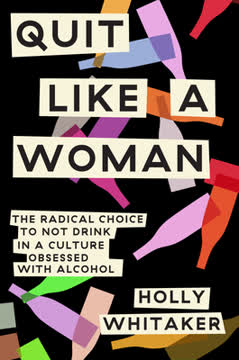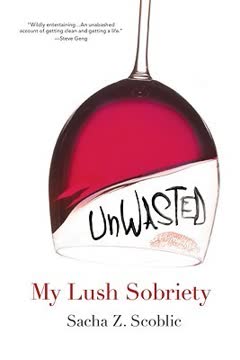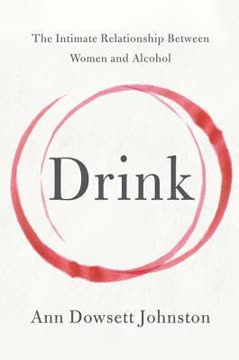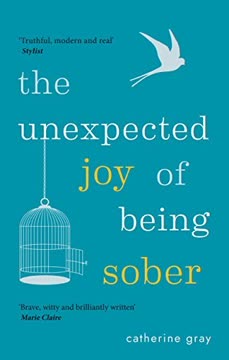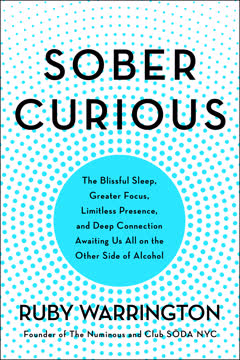Key Takeaways
1. Alcohol is a toxic drug, not a healthy lifestyle choice.
In other words, we drink—for fun—the same thing we use to make rocket fuel, house paint, antiseptics, solvents, perfumes, and deodorants, and to denature (i.e., take away the natural properties of, or kill) living organisms.
It's poison. Despite being normalized and marketed as a healthy or essential part of life, alcohol (ethanol) is a neurotoxic, psychoactive drug. It's used in industrial applications like fuel and solvents because it kills organisms by denaturing proteins. Our bodies recognize it as a toxin and prioritize its removal.
Health impacts. Even moderate consumption disrupts numerous bodily functions.
- Disrupts sleep cycles, leading to anxiety and irritability.
- Increases anxiety by releasing cortisol and adrenaline.
- Impairs liver detoxification, storing toxins in fat.
- Causes weight gain and interferes with weight loss.
- Damages brain function and blood sugar balance.
- Disrupts hormone function and is linked to seven cancers.
- Causes premature aging and destroys gut microbiome.
Wellness paradox. In a society obsessed with health, organic food, and clean living, drinking ethanol is a glaring contradiction. The idea that moderate drinking is healthy is a myth perpetuated by industry and outdated studies, ignoring the immediate toxic effects on the body.
2. Big Alcohol uses manipulative tactics like Big Tobacco.
It’s easier to fool people than to convince them that they have been fooled.
Engineered consent. Like Big Tobacco, Big Alcohol manipulates public perception to normalize and increase consumption. They co-opt cultural movements, like feminism, portraying drinking as an act of liberation or empowerment, particularly targeting women and marginalized groups. This creates "engineered consent," making people believe their choices are autonomous when they are influenced by marketing.
Engineered controversy. The alcohol industry, through organizations like Responsibility.org, promotes the idea of "drinking responsibly." This tactic, similar to Big Tobacco's "not enough research" claim, shifts blame from the substance to the individual, creating confusion and skepticism about alcohol's inherent dangers. It implies the problem lies with "irresponsible" people, not the toxic product itself.
Targeting emerging markets. Facing death among loyal customers, both industries aggressively target new consumers.
- Big Tobacco used Joe Camel to hook kids.
- Big Alcohol used Spuds MacKenzie and targets women with "mommy juice" culture and pink branding.
- Both expand into Low-to Middle-Income Countries, increasing addiction and death rates globally for profit.
3. The label "alcoholic" is harmful and misplaces blame.
Alcohol is the only drug in the world where, when you stop taking it, you are seen as having a disease.
Blaming the person. The concept of "alcoholic" implies a fundamental difference between "normal" drinkers and those with a problem, suggesting the issue lies with a defective individual rather than the addictive substance or the culture promoting it. This eugenicist idea, historically used to marginalize vulnerable populations, protects the alcohol industry from accountability.
False security. This binary thinking prevents many people from examining their relationship with alcohol. If they don't fit the extreme "alcoholic" stereotype (pissing the bed, DUIs), they assume they don't have a problem, even if alcohol negatively impacts their life. This allows problematic drinking to escalate unchecked.
Limits healing. The label carries heavy stigma and fear, making people resistant to seeking help. It suggests an incurable, lifelong disease, trapping individuals in a narrative of brokenness and powerlessness. Ditching the label allows for a focus on healing the whole person and addressing the cultural context of drinking.
4. Addiction is a Two-Part Problem: Root Causes & Cycle.
Addiction begins with the hope that something “out there” can instantly fill up the emptiness inside.
Beyond the substance. Addiction isn't just about the drug; it's a complex response to underlying issues. It's a "Two-Part Problem" involving root causes and the biological cycle of dependence. Focusing solely on abstinence without addressing the roots is like treating a symptom while ignoring the disease.
Root causes. These are the underlying factors driving the need to escape or self-medicate.
- Unhealed trauma (Big T and little t).
- Disconnection from self, others, purpose, and culture.
- Societal oppression (sexism, racism, classism, etc.).
- Inability to self-regulate emotions or discomfort.
- Nutritional imbalances and physical health issues.
Cycle of addiction. Repeated use of a substance or behavior to cope creates a biological feedback loop. Alcohol floods the brain with dopamine, hijacking the survival instinct and weakening the prefrontal cortex (judgment, willpower). This top-down control flips, making the primitive brain prioritize alcohol seeking, perpetuating the cycle despite negative consequences.
5. Traditional recovery models are often patriarchal and ineffective for women.
If being reminded of how much we are not God, how little control and power we have, or claiming our fallibility and insignificance and humility was the antidote to a drinking problem, women wouldn’t have drinking problems.
Built for men. Alcoholics Anonymous (AA), the dominant recovery model, was founded by and for upper-middle-class white men in the 1930s. Its core tenets, like deflating the ego and admitting powerlessness, were designed to counter the specific issues of men who were sick from an overdeveloped sense of power and control in a patriarchal society.
Harmful to women. These tenets can be detrimental to women and marginalized groups who already lack power, voice, and a strong sense of self.
- Self-silencing and self-naughting (ego destruction) reinforce existing oppression.
- Admitting powerlessness can be re-traumatizing for those who already feel powerless.
- Focus on character defects ignores societal factors contributing to addiction.
- Anonymity and lack of central authority can leave vulnerable members unprotected.
Systemic issue. AA's principles permeate the entire addiction treatment landscape, influencing therapy, rehabs, and the criminal justice system. This means even those not in AA are often subjected to its patriarchal framework, which can actively work against the healing needs of women and other oppressed individuals.
6. A feminine-centric recovery builds self, agency, and trust.
There is nothing stronger than a broken woman who has rebuilt herself.
Rebuilding, not destroying. Unlike patriarchal models that seek to break down the ego, a feminine-centric approach focuses on building up the self, agency, and self-trust. It recognizes that women often come into recovery already "cratered" and need empowerment, not further diminishment.
Core beliefs. This approach is guided by principles that counter societal conditioning.
- Self-Advocacy: Mothering yourself, growing agency, choosing guilt over resentment, setting boundaries, cultivating power.
- Self-Trust: Trusting your gut, knowing what you can't "fuck with," trying everything with an open mind.
- Self-Practice: Embracing willingness, understanding surrender, seeing recovery as an upgrade, committing to practice, taking holistic action, evolving.
Bottom-up healing. This paradigm supports individual needs and intuition, rather than imposing a rigid, external structure. The goal is not just abstinence, but creating a life so fulfilling that escape is no longer desired, centered on reclaiming one's voice, power, and desires.
7. Quitting requires understanding habits, willpower, and energy management.
You don’t have to use willpower when you don’t want to do something.
Beyond willpower. Quitting isn't just about having enough willpower, which is a finite cognitive resource. It involves understanding how habits are formed (cue-routine-reward loop) and how to manage your energy throughout the day to avoid burnout that triggers cravings.
Unified mind. Cognitive dissonance (conflicting thoughts about drinking) drains willpower. Achieving a "unified mind" where the desire to not drink outweighs the perceived benefits eliminates the internal battle. This is supported by dismantling confirmation bias about alcohol's benefits.
Strategic quitting. Quitting is a process that requires planning and training, not just a sudden decision.
- Create new habits and rituals (morning, midday, evening) to replace old ones and automate positive behaviors.
- Manage energy by avoiding overstimulation, taking breath breaks, eating regularly, and setting boundaries.
- Build a "toolbox" of healthy coping mechanisms to turn to instead of alcohol.
- Learn to engage directly with cravings (urge surfing) rather than just resisting them.
8. Healing involves addressing root causes holistically (trauma, health, etc.).
Unhealed traumas, an inability to be with ourselves, destructive patterns of behavior, abuse and self-abuse, defects in self-regulation, lack of purpose or existential meaning, nutritional imbalances, and neglected physical bodies all need to be addressed so that we don’t simply move from one crappy coping mechanism (like wine) to another (like shopping).
Holistic approach. Lasting recovery requires addressing the multifaceted reasons driving addiction. It's not enough to stop drinking; one must heal the underlying wounds and imbalances that made escape necessary in the first place. This involves tending to physical, mental, emotional, and spiritual health.
Addressing trauma. Trauma, stored in the body, often fuels addiction. Renegotiating trauma requires somatic (body-based) therapies like EMDR, EFT, or SE, as well as practices like meditation, yoga, and breathwork to discharge stuck energy and reconnect with the body.
Physical well-being. Addiction impacts physical health, and imbalances can perpetuate addictive patterns.
- Prioritize sleep (7-8 hours).
- Eat regularly (every 3-4 hours) to stabilize blood sugar.
- Consume protein and healthy fats for brain and hormone health.
- Hydrate adequately for detoxification.
- Move your body daily.
- Eat whole, nutrient-dense foods.
Beyond the body. Healing also involves addressing finances, career, purpose, spirituality, and any other area of life that contributes to discomfort or disconnection. It's a continuous process of building a life you don't need to escape from.
9. Relationships and community are essential for recovery.
The opposite of addiction is connection.
Biological need. Humans are wired for connection and cooperation; it's fundamental to our survival and well-being. Addiction often stems from disconnection – from self, others, and meaningful purpose. Rebuilding healthy connections is vital for healing.
Navigating change. Sobriety often disrupts existing relationships, as social circles may be centered around drinking. This can lead to intense loneliness and isolation, even while needing support the most. It's crucial to understand this is a normal part of the process.
Building new connections. Finding a supportive community is key.
- Seek out a "care team" (therapists, coaches, mentors) for guidance and support.
- Find "peer people" who understand your journey, through recovery groups or shared interests.
- Embrace the tension of needing connection while also needing solitude to reconnect with yourself.
- Be brave in putting yourself out there to meet new people aligned with your evolving self.
10. Life without alcohol is an adventure of self-discovery.
Tell me, what is it you plan to do with your one wild and precious life?
Beyond boring. The fear that life without alcohol will be boring is a lie perpetuated by alcohol culture. Removing alcohol doesn't remove fun; it removes a depressant and anesthetic that dulls genuine experience and limits options. Sobriety opens the door to a richer, more authentic life.
Reclaiming joy. Sobriety allows you to reconnect with simple pleasures and childlike wonder that alcohol suppressed.
- Enjoy "normal things" like reading, hiking, or movies.
- Embrace silliness and act like a kid again.
- Discover the value of solitude and embrace introverted tendencies.
- Connect with your "radical crone" – the part of you that doesn't take shit and does what she wants.
Creative expression. Sobriety often unlocks suppressed creativity, providing a powerful outlet for self-expression and absorption. Creating art, writing, or building something meaningful can become a source of deep fulfillment.
Seeing anew. Sobriety allows you to see the world with fresh eyes, appreciating the wonder and magic in everyday life. It's an invitation to be fully present and engaged, finding adventure in risks and embracing your authentic self.
11. Sobriety is a social justice issue tied to systemic oppression.
It is no measure of health to be well adjusted to a sick society.
Beyond individual fault. Addiction is not just an individual failing; it's deeply intertwined with systemic issues. Alcohol culture, the War on Drugs, the Prison Industrial Complex, and unchecked capitalism all contribute to widespread sickness and addiction, disproportionately harming marginalized communities.
Intersectional issue. Sobriety is a social justice issue because it intersects with sexism, racism, classism, homophobia, and other forms of oppression. These systems create the conditions that drive people to addiction and shape how recovery is accessed and experienced.
Radical self-awareness. The path to recovery requires confronting personal wounds and societal conditioning.
- Claiming your voice, power, and needs goes against patriarchal norms.
- Healing from trauma requires acknowledging the ways society has harmed you.
- Understanding how systems of oppression contribute to addiction is crucial for holistic healing.
Recovery as resistance. Choosing sobriety and healing is an act of rebellion against a sick society that benefits from keeping people down and disconnected. By reclaiming self-awareness and personal power, individuals contribute to a collective momentum for change. The revolution begins within.
Last updated:
FAQ
What’s Quit Like a Woman by Holly Whitaker about?
- Focus on women and alcohol: The book explores the unique challenges women face with alcohol addiction in a culture that glamorizes drinking, highlighting how traditional recovery systems often fail women.
- Personal narrative and activism: Whitaker blends her own story of addiction and recovery with a call for a feminist revolution in how society views and treats alcohol addiction.
- Cultural and systemic critique: The book critiques the normalization of alcohol, linking it to patriarchy, capitalism, and systemic oppression, and argues for reclaiming power and identity beyond alcohol.
Why should I read Quit Like a Woman by Holly Whitaker?
- Radical new perspective: The book challenges traditional addiction models, especially the disease model and AA-centric recovery, offering a fresh, feminist, and culturally aware approach.
- Empowering and practical: Whitaker provides actionable advice and rituals, focusing on self-love, agency, and holistic healing rather than shame and submission.
- Broader social context: The book connects alcohol addiction to systemic issues like sexism and capitalism, empowering readers to see addiction as a collective, not just individual, problem.
What are the key takeaways from Quit Like a Woman by Holly Whitaker?
- Alcohol is a normalized poison: Ethanol is a neurotoxic, carcinogenic substance, yet it is glamorized and normalized, especially among women.
- No such thing as “alcoholic”: The label is harmful and rooted in eugenics, creating a false dichotomy that prevents many from recognizing problematic drinking.
- Recovery must be feminine-centric: Traditional recovery models often perpetuate patriarchal values; Whitaker advocates for approaches that honor women’s experiences and integrate mind, body, and community.
- Addiction is both cultural and individual: Healing requires addressing both root causes (trauma, oppression) and the cycle of addiction (habits, neurochemistry).
- Empowerment over submission: Recovery is about reclaiming power, setting boundaries, and practicing self-advocacy.
How does Quit Like a Woman by Holly Whitaker critique Alcoholics Anonymous (AA) and traditional recovery models?
- AA’s male-centric origins: AA was created by and for upper-middle-class white men in the 1930s, with spiritual and patriarchal frameworks that often alienate women and marginalized groups.
- Humility and ego deflation: The program’s emphasis on humility can be harmful to women who already struggle with self-worth and have been conditioned to be self-effacing.
- Structural limitations: The Twelve Steps and Traditions enforce anonymity and group control, limiting individual agency and failing to evolve with diverse needs.
- Cultural dominance: Even those who don’t participate in AA are influenced by its principles, which can perpetuate shame and silence rather than empowerment.
How does Holly Whitaker define addiction and its causes in Quit Like a Woman?
- Addiction as a two-part problem: It consists of root causes (trauma, disconnection, societal oppression) and the cycle of addiction (neurochemical changes, habit loops).
- No single cause or theory: The book reviews multiple addiction theories, highlighting that addiction is complex and multifaceted.
- Addiction is universal: Everyone who consumes alcohol must exert some control over it; addiction is not limited to a minority labeled “alcoholics.”
- Holistic healing required: Addressing both the root causes and the biological cycle is essential for lasting recovery.
What is the “feminine-centric recovery” approach in Quit Like a Woman by Holly Whitaker?
- Bottom-up empowerment: This approach assumes you are whole and the expert of your own life, creating a personalized healing path.
- Six elements framework: It includes working with core beliefs, breaking the addiction cycle, adding healthy coping mechanisms, addressing root causes, practicing sobriety flexibly, and evolving recovery as you grow.
- Self-advocacy and trust: Emphasizes mothering yourself, growing agency, setting boundaries, and cultivating power rather than submission or shame.
- Recovery as life practice: It’s about creating a life you don’t need to escape from, not just abstinence.
How does Quit Like a Woman by Holly Whitaker explain the impact of alcohol on the body and mind?
- Disrupts nearly every system: Alcohol impairs sleep, fuels anxiety, impedes detoxification, causes weight gain, damages the brain, and disrupts blood sugar and hormone balance.
- Carcinogenic and aging: Alcohol is linked to seven cancers, including breast cancer, and accelerates premature aging by depleting collagen and antioxidants.
- Even moderate drinking is harmful: One drink can trigger stress hormones and withdrawal-like symptoms, leaving the body in chronic stress.
- Contradicts wellness culture: Despite health consciousness, society continues to consume alcohol, often unaware of its harms.
How does Quit Like a Woman by Holly Whitaker address the cultural normalization and marketing of alcohol?
- Alcohol as a feminist symbol: Alcohol is marketed as a symbol of liberation and empowerment for women, co-opting feminist ideals to sell products.
- Industry manipulation: Big Alcohol uses tactics from Big Tobacco, including market consolidation and controversy to maintain consumption and avoid accountability.
- Alcohol and oppression: The book links alcohol use to systemic oppression, noting its disproportionate harm to women, LGBTQIA+ people, and communities of color.
- Normalization masks harm: Society’s acceptance of alcohol obscures its role in violence, health crises, and makes it harder to question or quit.
What practical tools and rituals does Quit Like a Woman by Holly Whitaker recommend for quitting drinking?
- Morning rituals: Wake up at the same time, avoid checking the phone, drink hot lemon water, meditate, read affirmations, and eat a protein-rich breakfast.
- Evening rituals: Replace drinking with sensory-rich, relaxing activities like baths, herbal tea, meditation, journaling, and movement.
- Consistency builds habit: Committing to these rituals daily for 30-40 days helps make sobriety automatic and supports managing stress and cravings.
- Unified decision over willpower: Success comes from making a firm decision to quit, reducing reliance on willpower and focusing on building sustainable new habits.
How does Holly Whitaker in Quit Like a Woman define and approach cravings?
- Cravings as intense urges: Cravings are described as overwhelming physical desires that feel impossible to resist.
- Two strategies for cravings: Change routines and environments to avoid triggers, or engage directly with cravings using the RASINS method (Recognize, Allow, set aside the Story, Investigate sensations, Name them, Surf the craving).
- Mindfulness and meditation: Engaging with cravings mindfully helps separate physical sensations from mental stories, reducing suffering and building resilience.
How does Quit Like a Woman by Holly Whitaker address trauma and its role in addiction recovery?
- Trauma as unprocessed energy: Trauma is stored in the body when fight, flight, or freeze responses are incomplete, causing ongoing suffering that addiction often masks.
- Big T vs. Little t trauma: Big T trauma involves acute severe events needing somatic therapies; Little t trauma accumulates daily and requires ongoing practices like meditation and breathwork.
- Therapy and self-care: The book stresses the importance of finding a good therapist and incorporating body-based healing practices to renegotiate trauma and support recovery.
What does Quit Like a Woman by Holly Whitaker say about relationships, social challenges, and living fully without alcohol?
- Relationships as growth opportunities: Difficult relationships reveal parts of ourselves to heal; every person encountered is an opportunity for personal evolution.
- Setting boundaries and self-care: Learning to say no and prioritize self-care is essential, even if it means losing some friendships or disappointing others.
- Navigating social isolation: Sobriety often fractures existing support systems; the book encourages building new connections through honesty, peer support, and community involvement.
- Rediscovering joy and fun: Simple activities and embracing childlike wonder can be deeply fulfilling, and sober sex and dating are explored as empowering, present experiences.
Review Summary
Quit Like a Woman received mixed reviews. Many praised its feminist perspective on alcohol culture and recovery, finding it empowering and insightful. Critics appreciated the author's personal story and research on the alcohol industry. However, some found the book privileged, politically charged, and dismissive of traditional recovery methods like AA. Readers were divided on the practicality of the author's suggested recovery techniques, with some finding them unrealistic for most women. The book's tone and structure were also points of contention, with some enjoying the writing style while others found it scattered and self-absorbed.
Similar Books
Download PDF
Download EPUB
.epub digital book format is ideal for reading ebooks on phones, tablets, and e-readers.
